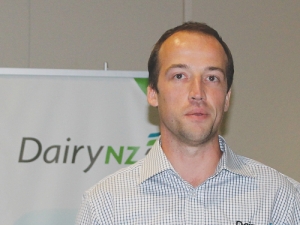Farmers and catchment groups leading the next wave of freshwater restoration
From nitrogen limits to ecosystem restoration –farmers and catchment groups are leading a new wave of environmental care, says DairyNZ.
 DairyNZ water specialist Tom Stephens says emotions and values now dominate decisions on water quality.
DairyNZ water specialist Tom Stephens says emotions and values now dominate decisions on water quality.
Emotions and values now come first in water quality assessment and science comes second, says a water quality specialist with DairyNZ, Tom Stephens.
But that is not necessarily bad for farmers: under changes to water quality assessment that quality is based on what the community wants. Farmers are part of that community and can have a say, he told the DairyNZ Farmers Forum in Northland.
“In the past, science came first and it has been disconnected from what the community wants,” says Stephens. “So the Government has flipped it on its head and said communities are now driving limit setting.”
Councils are setting up stakeholder groups and it is a “once in a lifetime” opportunity to have a say. “You guys get to set the rules. If you sit outside, you get what you are given,” Stephens told the forum.
Under the National Policy Statement for Freshwater Management, released last year, water quality is now defined on the basis of community values. Regional councils must set precise environmental limits to at least two values nationwide – ecosystem and human health.
“All the values aside, it is whether that waterway is fit for you (the community) to do what you want to do with it,” Stephens explains.
“If you are a farmer that is to farm, if you are local iwi that might be mihinga kai, if you are a hydro-electric plant it might the generation of power. All these things are balanced and you as a businessman or you as an individual have a range of values that need to be protected.
“Provided it is good enough to do what you want to do with it – its quality is good.
“What it means is the science is secondary because [an equal] number of, say, E.coli in that water may be bad in terms of swimming or fine in terms of hydro-electricity generation.”
The National Policy Statement is the directive from the Government to set water quality limits in each community. The plans must be in place by 2025. “The limits don’t have to be met by 2025 but you have to have a plan in place that will say by a set date that water quality will be good enough for the community.”
You need limits if your water quality is already good enough. If it is not you need targets to get back to the accepted quality within that community.
“If the water quality isn’t good enough for you to pursue your practices now but the community want them to be on the balance of consideration and consensus, then you need to put in place some framework by which you can claw back… to make that waterway good enough.”
Nutrients are one of the principle inadvertent outputs of a dairy system, particularly nitrogen but also phosphorus. There are also E.coli and sediments.
The core values in the National Policy Statement are ecosystem health and human health. But other values come in: for hydro-electricity you need flow; for gathering food on waterways you have to take into account E.coli.
Under the National Objectives Framework there is a score card for values – A, B, C and D. The guidelines show the community what can be measured, whether a value is being met and what grade can be assigned to those attributes.
For instance, A grade is good enough for swimming – 1:100 users might get ill from swimming; B grade, 1:20 users might get ill. C grade, it is not good enough to swim, but it is good enough for wading, fishing or boating. D grade is unacceptable: there is a minimum that must be met.
Swimming in New Zealand is in a clearly defined period from about November to April. So test results from this period or during heavy rainfalls could be presented by environmental lobbyists which could distort the picture.
As New Zealand marks the United Nations’ International Year of the Woman Farmer 2026 (IYWF 2026), industry leaders are challenging the misconception that women only support farming.
Fonterra’s impending exit from the Australian dairy industry is a major event but the story doesn’t change too much for farmers.
Expect greater collaboration between Massey University’s school of Agriculture and Environment and Ireland’s leading agriculture university, the University College of Dublin (UCD), in the future.
A partnership between Torere Macadamias Ltd and the Riddet Institute aims to unlock value from macadamia nuts while growing the next generation of Māori agribusiness researchers.
A new partnership between Dairy Women’s Network (DWN) and NZAgbiz aims to make evidence-based calf rearing practices accessible to all farm teams.
Despite some trying circumstances recently, the cherry season looks set to emerge on top of things.

OPINION: Here w go: the election date is set for November 7 and the politicians are out of the gate…
OPINION: ECan data was released a few days ago showing Canterbury farmers have made “giant strides on environmental performance”.